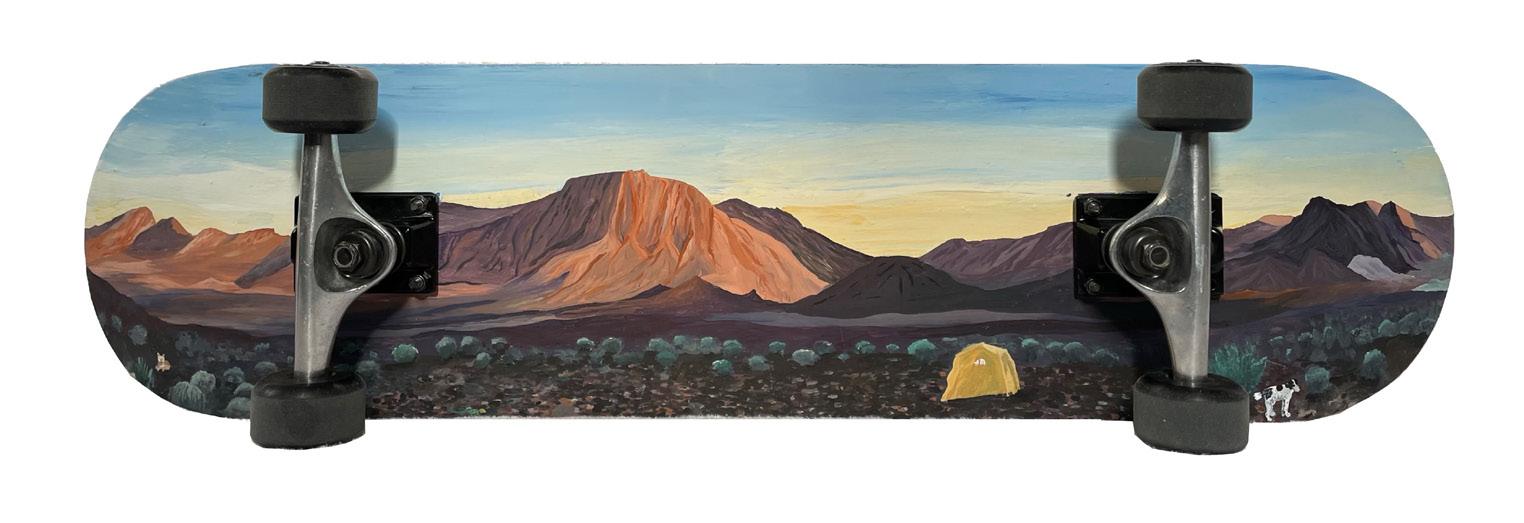
3 minute read
A Poem For My Grandma And Her Sweaters Eliza King
My grandmother’s love language is gifts, I think. When we made the drive down to see her once a year she always commented on how I’ve grown. How tall and beautiful I’ve become. And then she’d pull out a tape measure, a pencil, a paper to mark down my measurements. She’d tell me to lift my arms, push my shoulders down, stretch the tape from my shoulder to wrist.
A few months later, a package in the mail would show up. Inside, wrapped in pale pink tissue paper would be a sweater, handmade with the measurements she so carefully took the last time she saw me.
Advertisement
I didn’t see her enough when she lived close. I never had to wear the sweaters when we visited. And I feel bad. All of her love for me poured into her hard work, manifested as something to keep me warm. The distance between us she tries to fill with sweaters and love, to protect me from the cold and the life she knows can be cruel.
She knows that fathers leave, has seen it happen with her father, her husband, her son, but she also knows they can come back. Love can ebb and flow like the tide in the salty ocean that separates her from childhood.
But the sweaters never fit quite right. Beautifully made, with intricate stitches and flowers, gardens of stars on the sleeves that wind into constellations of petals and leaves on the body, encasing me in an awkward hug that doesn’t fit the careful design. Because my shoulders are too broad, my arms too long, it is too short for my torso. I am not petite like her. I tower above her with the height from my mother’s father. The space between us grows each time I see her.
I do not wear her sweaters that illuminate the distance between us. Too many cities to count between mine and hers. I have not heard her voice in years, only see it in broken English on the computer screen when we exchange emails once a month. And the love she pours into her sweaters seeps out into the dark corners of my closet.
Free Sheep
Zoë Chinander-McFaul
A sandy Prussian blue relief, rolled and inked on a scrap of newsprint. I worked late on the night of your birthday. The ink lodged itself under my nails. A proof is a print — a test of your first lino cuts. I see, the sheep is constrained in a rectangular world: moon, mound and melting snow. It is happy to be bound by edges. I wanted to be free-shaped after you. No longer barened onto newsprint (you printed me on a leaf) but scraped past your edges, ink lodged under your nails.
But unlike the sheep, stillborn forever on a scrap, I can’t bear to be an afterthought.
My Home is a Graveyard
Natalie Mazey
My home is a graveyard
Built to mourn the living Post-it notes planted on kitchen cabinets Act as headstones painted blue.
Lilacs wilt on granite countertops
Amongst mail growing up like weeds, Invasive and persistent A reminder roses — here — once bloomed.
We scrape photographs from walls Like moss clinging to tree bark Then bury the living in boxes shut with packing tape.
We change the locks To keep out the ghosts
Forgetting walls cannot stop spirits from passing through.
We start over without an end Watching ivy scale brick walls Slow at first, then all at once.
I watch as time molds a home into a house As five voices fade to three.
I watch as white lies are tainted red in my sleep.
I pray my pain has taken root here That it will only take leaving to let go So I exit the door with eggshell paint peeling And exit the two-car garage with a code My fingers haven’t memorized And say
Goodbye
To the ghosts and the walls they occupy. No one teaches you to mourn the living But I’ve found it’s a game of playing pretend. So I run away — No.
I run towards —
Something alive,
Something growing, Something new.
On The Mountain
Zoë Roos Scheuerman
I went snow-blind, somersaulting between bone-white earth and dust-pale sky, the whole landscape looking like God had run over the mountains with his car, no differentiation or dimension. My only lighthouse was the aurora, undulating like the forfeiter’s flag. A flash of orange, like a traffic cone. The feet of a puffin, who for a moment sits on the same rock and then flew away.




